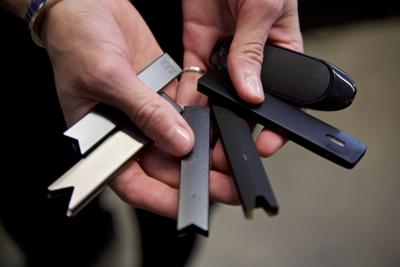COLUMBIA — South Carolina public school districts representing one-quarter of all students statewide are now suing vaping giant Juul and other e-cigarette companies on accusations of marketing to teens and health risks.
And more could be on the way with districts covering another 14 percent of S.C pupils weighing lawsuits.
The Palmetto State districts are part of national movement to seek financial compensation from e-cigarette manufacturers. More than 750 such suits have been filed across America as of July 2020, according to Florida-based consumer advocacy group Drugwatch.
Carl Solomon, a Columbia attorney representing several South Carolina school districts in the lawsuits, said the expectation isn’t for a big payout but to hold Juul and others culpable for the day-to-day impact of its products.
“The addiction rate to Juul and other vaping products has created issues as it has gone up, even as smoking (addiction) has gone down” among teens, he said. “We don’t believe that to be unintentional. When you get things that enter into schools, districts have to address those issues.”
A Juul spokesman reiterated what he told The Post and Courier in February that the company is dedicated to preventing underage people from using their products.
“We will continue to reset the vapor category in the U.S. and seek to earn the trust of society by working cooperatively with attorneys general, legislators, regulators, public health officials, and other stakeholders to combat underage use and transition adult smokers from combustible cigarettes,” Juul spokesman Austin Finan said.
That hasn't stopped six school districts — including four of the state’s six largest in Greenville, Charleston, Berkeley and Lexington One — from joining a class-action suit against e-cigarette makers, according to data collected by Richland Two officials who are weighing a suit of their own.
The other districts suing are in Pickens and Anderson 3, one of the state's smaller districts with 2,500 students. Half of the districts filed suits in April, according to court records.
Three larger districts — Anderson One, Orangeburg and Richland One — have taken steps to file suits as their boards all voted to hire attorneys.
Some midsized and smaller districts — Chesterfield, Cherokee, Greenwood 50, Greenwood 52 and Marlboro — are either considering filing suit or have hosted informal talks to do so, Richland Two chief financial officer Harry Miley told district trustees on April 27.
Nearly one-fourth of South Carolina teens reported using e-cigarettes in the past 30 days, according to a U.S. Centers for Disease Control and Prevention report in 2019.
During near-simultaneous board meetings on April 27, Richland One trustees unanimously voted to retain San Francisco-based attorney William Shinoff with Frantz Law Group to represent the 22,000-student district in a possible suit, while Richland Two board members voted to reconsider a Feb. 9 vote opting out of a civil action aimed at Juul and e-cigarette makers.
Leaders at Richland Two, South Carolina's fifth-largest district with 27,000 students, were considering changing their stance when they learned there was no upfront cost to joining the suit, with attorneys recouping any payments through future settlements or a judgment.
“We say we want to be a district that is on the cutting edge and being progressive, to me a lawsuit that can only be good that doesn't cost us anything, I don't see where there's a loss for us in participating in that,” board member Teresa Holmes said.
Greenville County Schools board chair Lynda Leventis-Wells said trustees of the 74,000-student district decided in March to sue Juul.
“We agreed to pursue legal action against the makers of Juul e-cigarettes for purposely targeting its products to school-age children and the impact that it has had on the school district and its students,” she said in a statement.
In its lawsuit filed April 2, the Pickens County School District said use of vaping products has led to “increased security staff time spent addressing discipline and supervision issues, and increased counselor time spent speaking to addicted students about this epidemic.” The district did not include data on vaping or tobacco-use rates among students in the lawsuit.
Richland Two Superintendent Baron Davis said if his district receives any compensation, the proceeds could be used in several ways, including setting up a scholarship for students pursuing health careers or more aggressive marketing and education campaigns around the dangers of smoking.











